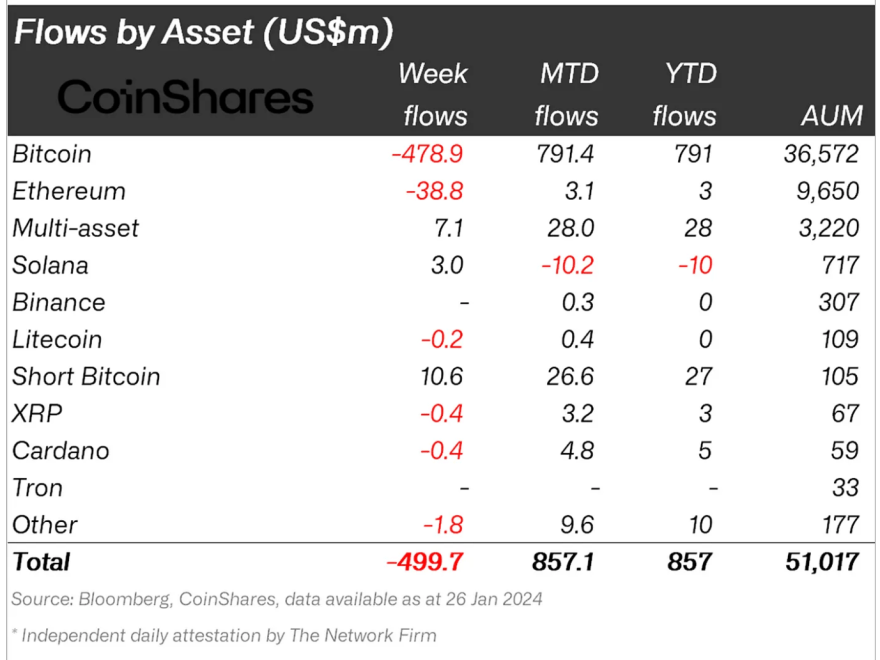ARTICLE AD BOX
The crypto market, particularly Bitcoin, has recently experienced significant outflows. According to a recent report from CoinShares, digital asset investment products worldwide saw net outflows of $500 million last week.
These outflows predominantly stemmed from Grayscale’s converted spot Bitcoin exchange-traded fund (GBTC), though its impact seems to be diminishing with daily outflows reducing progressively throughout the week. James Butterfill, Head of Research at CoinShares, highlights this trend, noting a decrease in the intensity of outflows.
While Grayscale’s GBTC experienced a decrease in outflows, there has been a surge in capital moving into the newly established spot Bitcoin ETFs. Last week, these spot ETFs collectively attracted $1.8 billion in fresh capital, with BlackRock’s IBIT and Fidelity’s FBTC at the forefront, securing $744.7 million and $643.2 million, respectively.
Since their debut on January 11, these fresh market entrants have amassed $5.8 billion in total inflows. This influx has effectively balanced out the $5 billion that flowed out of GBTC, culminating in a net positive inflow of $759.4 million into the crypto market funds.
Global Outflows And Bitcoin’s Market Resilience
The impact of these outflows extends beyond Grayscale, with other altcoin-based funds also registering net outflows. Ethereum investment products, for instance, saw $39 million left, with smaller amounts also exiting Polkadot and Chainlink funds.
Solana was an exception in this trend, which witnessed inflows worth $3 million. Interestingly, blockchain equities continued to attract investments, with an additional $17 million inflow last week.

The regional analysis further sheds light on these market movements. US-based funds experienced the most significant net outflows, totaling $409 million, while Switzerland and Germany saw outflows of $60 million and $32 million, respectively.
Brazil emerged as a notable exception, registering $10.3 million. Butterfill suggests that these outflows, particularly in the US, were likely prompted by the substantial outflows from Grayscale, totaling $5 billion, contributing to broader market uncertainties.
Despite these market dynamics, Bitcoin has shown slight signs of recovery, regaining 3.4% of its value in the past 7 days after a recent dip below $39,000. Bitcoin trades above this mark at $42,074, though it has seen a modest 0.7% decrease over the past day.
Historical Patterns And Future Outlook For Bitcoin
Analysts and investors closely monitor patterns and indicators for future trends as the market navigates through these shifts. Crypto analyst Jelle has highlighted an interesting historical pattern in Bitcoin’s performance.
The analyst notes that February has historically been a bullish month for Bitcoin, particularly following a bearish January and a positive performance in the last four months of the previous year.
Jelle backs this up with Coinglass data, which supports this observation, showing that in 2015 and 2016, when Bitcoin closed the last four months of the year in the green, it followed up with a bearish January and a bullish February.
Looks like #Bitcoin continues the pattern we’ve been monitoring since September.
4 months in the green, one in the red.
If history keeps repeating, February should be strong. pic.twitter.com/fWbXw4rlvK
— Jelle (@CryptoJelleNL) January 23, 2024
Given this pattern, Jelle anticipates that February could again be a positive month for Bitcoin, potentially bringing significant gains.
.Featured image from Unsplash, Chart from TradingView
.png)
 11 months ago
6
11 months ago
6








 English (US)
English (US)